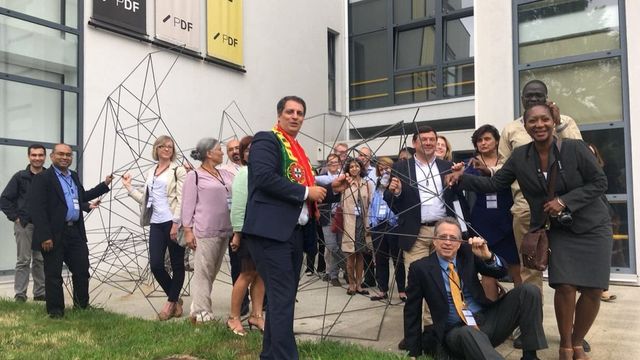SDSN Welcomes the Consortium of Master’s in Development Practice (MDP) Programs
SDSN is delighted to announce the integration of the Association of the Global Master’s in Development Practice (MDP) programs into the SDG Academy as of July 2019. As a part of this transition, we are especially pleased to welcome Lucia Rodriguez, who serves as the Director of the Global Master’s in Development Practice (MDP) project as the newest member of the SDG Academy team at SDSN in New York.
The MDP is a two-year, graduate-level program designed to train aspiring practitioners to understand, design, and manage integrated approaches to sustainable development challenges. The rigorous academic curriculum spans four disciplines: health sciences, natural sciences, social sciences, and management. It also fosters the acquisition of critical knowledge, skills, and behavioral attributes needed to work successfully in developing or developed societies. At the core of the curriculum is a field practicum component, lasting two to three months, in which students learn through hands-on participation on development projects and contribute solutions to real-world problems.
Today there are 37 MDP programs (and expanding) in 26 countries around the world. Most courses are face-to-face, but some Association members, incorporate some form of “blended learning,” a combination of online and face-to-face interaction. Regardless of how content is delivered, the curriculum can offer a variety of courses. Hundreds of students are currently enrolled in MDP programs, including a large number from Asian, South American, and Sub-Saharan African countries. Students come from diverse socioeconomic backgrounds; represent multiple cultures, languages, and ethnicities; and have technical skills and interests that run the gamut of development issues. The overall mean student age is just over 25 years. Women outnumber men, representing two-thirds of the student body in some MDP programs. Today there are thousands of MDP alumni around the world working in multilateral organizations, government ministries and non-profit organizations, among other things.
The MDP is the only one of its kind—a global, interdisciplinary, collaborative program that trains professionals in the field of sustainable development; students include generalist development practitioners, experts in a particular domain of sustainable development, policy administrators, private sector professionals, educators and professionals from the public sector. Upon graduating from the MDP program, many return to work in these professions.
Dr. Lucia Rodriguez works with the members of the Global Association of MDP programs to manage, scale up, and secure the financial sustainability of the global network of MDP programs. At her new home within the SDG Academy at SDSN, Lucia looks forward to opportunities to engage with SDSN members and expand the reach of the program by creating new ones. Pedagogical innovations promise accessibility of this program to future MDP cohorts. A broad canvas of learning priorities as demonstrated through the Sustainable Development Goals (SDGs) and Agenda 2030 presents new fields of study for MDP programs; and fresh partnerships within and outside of the SDSN network beckon.
SDSN is excited at the new possibilities that the MDP brings to our goal of education for sustainable development; and in our shared mission of supporting academic institutions around the world to build excellent programs of development practice. We look forward to deepening this relationship, and in supporting the MDP to meet the challenges of sustainable development that our current times present.
If you are an SDSN member, and want to join the MDP program, or simply learn more, please visit www.mdpglobal.org or contact Lucia at lucia.rodriguez@unsdsn.org.
Partner MDP Institutions (as of July 2019)
Africa
University of Botswana, Botswana
Université Cheikh Anta Diop, Senegal
University of Ibadan, Nigeria
University of Pretoria, South Africa
East Asia
National Taiwan University, Taiwan
Royal University of Bhutan, Bhutan
Tsinghua University, China
KDI School of Public Policy and Management, Republic of Korea
Europe
Hebrew University of Jerusalem AND Jerusalem Institute’s Milken Innovation Center, Israel
Sciences Po – Paris School of International Affairs (PSIA), France
Lund University, Sweden
Trinity College Dublin, Ireland
University College Dublin, Ireland
Universidad Carlos III de Madrid, Spain
ETH-Swiss Federal Institute of Technology, Zurich, Switzerland
Instituto Superior de Engenharia do Porto, Portugal
Universidad Carlos III de Madrid, Spain
Latin America
CATIE (Centro Agronómico Tropical de Investigación y Enseñanza), Costa Rica
Universidad de Los Andes, Colombia
Universidade Federal Rural do Rio de Janeiro, Brazil
North America
Columbia University, USA
Emory University, USA
Harvard University, USA
Regis University, USA
University of Arizona, USA
University of California, Berkeley, USA
University of Florida, USA
University of Minnesota, USA
University of Waterloo, Canada
University of Winnipeg, Canada
South Asia/Central Asia
BRAC Institute of Governance and Development (BIGD), BRAC University, Bangladesh
James Cook University, Australia
TERI University, India
Universiti Sains Malaysia (Penang), Malaysia
University of Peradeniya, Sri Lanka
Al-Farabi Kazakh National University, Kazakhstan
Monash University, Australia
Sunway University, Malaysia
